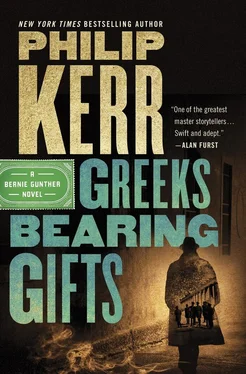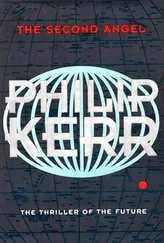He let the gun go and I thrust it quickly into my coat pocket.
We got out of the car and I followed him through the picket gate. We walked around to the side of the house and the back door. The organist had started playing another cantata, which the rooks and crows seemed to enjoy more than I did, the way they were joining in on the chorus. By now there were a few lights on in the house but only on the second floor.
Schramma stopped by a wheelbarrow that was leaning against the wall and glanced in the window through the back door, which wasn’t locked. A few moments later we were in the house. There was a strong smell of apples and cinnamon in the air as if someone had been baking strudel but it didn’t make me feel hungry. In fact, I felt a little sick; I couldn’t help but notice that the grip on the .38 in Schramma’s hand was Dekka-taped as if he planned on leaving it at the scene, which didn’t augur well for anyone, me least of all. You don’t plan to leave a gun behind unless you’ve used it. So I was feeling scared about what I’d let myself in for. But what choice did I have? Christof Ganz was just getting started in life and it wasn’t like there were any other new identities available to me. Not even in Germany. For the moment, at least, my foot was well and truly caught between the serrated steel jaws of Schramma’s mantrap.
Schramma balanced his half-chewed cigar on the side of the kitchen table, pulled the scarf over his nose and mouth, outlaw-style, and then nodded at me to do the same. We walked quietly along a dimly lit corridor toward a room with voices at the front of the house.
Inside the room everything looked straightforward enough: a short man with a Kaiser Wilhelm waxed mustache and wearing a green leather waistcoat, the general was standing in the dining room, opposite a man in a Gannex coat who was younger than I’d supposed, with one of those little blond beards beloved of aspirant Leninists. The money, all ten thousand of it, lay on the red-checkered tablecloth under the eyes of a Northern Renaissance portrait of a young woman with a folded vellum letter in her hand. If it was good news her expression wasn’t giving anything away. Then again, she was losing the hair on her crown, so she didn’t have much to be cheerful about.
“Who the hell are you?” spluttered the general. “What’s the meaning of this?”
“The gun and the mask ought to be a bit of a clue, General,” said Schramma. “I mean to steal this money. But if you do exactly what you’re told you won’t get hurt.” He stood to one side and jerked the gun at the door. “Downstairs. Now.”
The general walked to the door but the other man stayed put as if Schramma hadn’t been speaking to him.
“You too,” added Schramma.
The man in the Gannex coat frowned as if this was somehow a surprise to him. “Me?”
Schramma put the gun against the man’s head and lifted the edge of the Karakul hat so that it now sat on the back of his blond-haired head like a skullcap. Quickly he frisked him for a gun and not finding one said, “What do you want, a memo? Yes, you too.”
The man in the hat gave Schramma an angry, bitter sort of look, almost as if they knew each other, and perhaps he would have said more but for the gun in the cop’s hand. It’s never a good idea to be brave around a .38. People have been shot for less. I expect the general knew that. And like me perhaps he’d noticed that the butt of the gun was taped, and the trigger, too, probably. So he bit his lip, wisely I thought, and walked ahead of us, with me bringing up the rear like some dumb postilion who looked like he was just along for the ride.
I followed the three men down the creaking wooden stairs. At the end of a long stone-flagged corridor was a big gray metal door with two lock handles. Underneath a spy hole was the word PANZERLIT. It was an old bomb shelter.
“Open it,” Schramma told the general.
“What are you going to do?” asked the general, turning the handle. He opened the door and switched on the light to reveal a largish wine cellar. A rich smell of mildewed bottles and damp filled the air. I didn’t know much about wine, but I estimated there must have been almost a thousand bottles in there. It was the best-equipped bomb shelter I’d ever seen.
“I’m going to lock you in here so you can’t call the police,” said Schramma. He jerked the pistol again. “Get inside. Both of you.”
“You won’t get away with this,” said the man in the hat. He snatched it off his head and held it between his hands like he was about to pray.
“No?”
“No. You’re making a big mistake. You know who this money belongs to? To the foreign intelligence division of the East German Ministry for State Security, that’s who.”
“Shut up and get in the cellar,” said Schramma.
“The MfS will come after you. You know that, don’t you? This money is only going to buy you a lot of sleepless nights.”
“That’s all right. I don’t sleep much anyway.”
The two men walked into the wine cellar and turned to face Schramma as he followed them a short way inside. Then he put his forefinger in one ear and what with the tape on the butt of the gun I knew for certain that he was going to kill them both. Instinctively I took a step back as he took one forward — so that he didn’t miss his target, I guess — and, the next moment, he shot the general and then he’d shot the man in the hat as well, both of them at close enough range to do some fatal damage. In the earsplitting second’s gap between the two gunshots I decided I might very well be his third victim and, stepping quickly back again, I slammed the steel door behind me and jammed it shut with a large ax handle that someone had left lying on the floor.
I snatched the mask from my face and took a deep breath of the combusted air. My ears were whistling from the gunshots and it was a second or two before I even heard Schramma hammering on the door and shouting. Through the peephole I could see one of his bright eyes fixed on me like a piece of blue topaz. Meanwhile I managed to jam the other handle with half a brick. The aroma of strudel in the house was gone; now it was just gunpowder and death I could smell.
“What the hell do you think you’re doing, Gunther?” he shouted quietly. “Let me out of here.”
“I don’t think so,” I said.
“Don’t be an idiot. We don’t have time for this. We need to get out of here in case someone reported hearing those shots.”
“I’m glad you mentioned that.” I dropped the magazine from the Walther and inspected the ammunition quickly. Blanks. Like I’d thought. “Why did you kill them? You didn’t need to do that.”
“Why take the risk of them identifying us? That’s the way I look at it.”
“Oh, I get that. Only the way I figure it, you were going to shoot me, too. Why not? Right now I’m more expendable than a stick of celery.”
“What makes you say that?”
“Well, for one thing, you’re a corrupt cop who knows how to dress up a murder scene. And for another, this gun you gave me is loaded with blanks.”
“Sure. I wanted to see if I could trust you. Look, listen to me. Let me tell you about these two Fritzes I just shot. The one with the hat was Stasi. The other was a Nazi war criminal. Got away with it for years. No one’s going to weep about these two. They both had it coming.”
“I’ve pulled the trigger a couple of times on some people who had it coming. At least, that’s what I told myself at the time. Now I realize that all of us have got it coming. Me, probably. You, especially.”
“Forget that. They’re dead now. Look, maybe ten percent of the take wasn’t fair of me. I get that. So how about half? I’ll give you half the money. Only don’t leave me in here. What do you say, Gunther?”
Читать дальше











